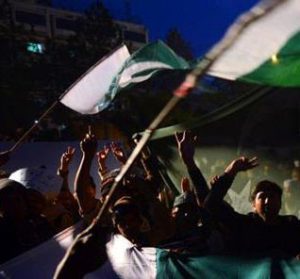LAHORE, Pakistan (Morning Star News) – A Muslim political candidate suspected of murdering a Christian has instigated calls from mosque loudspeakers for attacks on Christians, whom he blames for his May 11 election loss.
Tensions were high in Punjab Province’s Okara district after provincial assembly seat candidate Mehr Abdul Sattar, sought by police in connection with a 2008 murder, on May 13 arranged for mosque calls for violence against Christian villages.
“Burn their homes to the ground … Punish them such that they forget Gojra and Joseph Colony,” blared village mosques in the district, according to Younas Iqbal, chairman of the Anjuman-e-Mazareen Punjab, a peasant movement fighting for land rights.
Iqbal told Morning Star News by phone that that when unofficial election results were announced on May 12, Sattar’s supporters ambushed a convoy of about 100 Christians on their way to congratulate his opponent on his victory.
“They destroyed two motorcycles and threw them in the canal, besides damaging a tractor,” Iqbal said. “We went to the Okara Saddar Police Station to register a case, but the police officials refused to move against Mehr.”
Recent religious furor has been easily stoked in Pakistan. In Lahore on March 9, about 3,000 Muslims attacked Christians in Joseph Colony, destroying 175 homes, after rumors spread of an alleged remark against Islam by a Christian (see Morning Star News, March 11). In Gojra in 2009, eight Christians were burned alive, 100 houses looted and 50 homes set ablaze after a blasphemy accusation.
Sattar has targeted Christians in several villages, designated by number-letter combinations from British colonial times, particularly village 8/4-L, for voting against him, Iqbal said. Christians largely voted for Mian Yawar Zaman, also a Muslim, for a provincial assembly seat in the general election on May 11.
Iqbal said that early on May 13, Sattar’s men prevented the Christian principal of the Government Primary School, Shamoun Masih, men from entering the institution.
“They told Shamoun that since the Christians had voted against Mehr, he wouldn’t be allowed inside,” he said. “They also roughed him up, but there were no serious injuries. In 3/4-L village, Amjad Masih was harassed.”
Iqbal added that Sattar’s supporters had also forcibly occupied land of some Christians.
“The threat of violence in 8/4-L is most serious because of the tiny Christian population there,” Iqbal said of the village of roughly 600 Christians. “Sensing the gravity of the situation, we immediately informed Zaman, the legislator-elect, who pressed the police to deploy personnel in the village.”
Okara Police Chief Rao Jabbar told Morning Star News that officers would take all necessary measures to protect the Christian peasants.
“We have taken notice of the inciting speeches made by Mehr Abdul Sattar, and I have assured the Christians that we will initiate legal action against him,” Jabbar said. “Meantime, I’ve directed all police officers concerned to remain vigilant and ensure that there is no damage to life and property of the Christians.”
Police have been helpless in the face of Sattar, though, Iqbal said.
“Even though the district police chief has promised to protect the area’s Christians, the danger will always remain there,” he said. “Several cases have been registered against Mehr, but no action has been taken against him. In January this year, the police tried to arrest Mehr and his men in a murder case, but his supporters blocked three main highways for several hours, forcing the police to abandon action against him.”
Police sought Sattar in connection with the murder of Javed Masih, a Christian who had opposed Sattar in a 2008 election.
“The late Javed Masih used to tell the peasants to vote according to their conscience and not get intimidated by gangsters like Mehr,” Iqbal said. “His efforts bore fruit, and Mehr lost the general election in 2008. Unfortunately, Masih had to sacrifice his life for the cause, while several others were injured in an armed attack by Mehr’s men.”
In this month’s election, Iqbal likewise told Christians to vote for the person they thought best. Zaman belongs to the Pakistan Muslim League-Nawaz, which has emerged as the single largest party in national and Punjab assemblies.
“The humiliating defeat further stoked anger in Mehr, and he’s now bent upon punishing us,” he said, adding that Sattar has targeted no Muslims for opposing him.
“Our application against Mehr Abdul Sattar is still pending with the police, but it seems more Christian blood will be shed before he is brought to justice,” Iqbal said. “But this will not deter us from using our right to vote. We refuse to give in to the tyranny of criminals like Mehr.”
Besides village 8/4-L, the threatened Christian areas in provincial constituency PP-191 are village 10/4-L, with an estimated Christian population of 3,000; 11/4-L, where 2,000 Christians live; and 26/4-L, in which around 1,000 Christians are settled.
The peasant land movement that became the issue of contention for Sattar arose more than 10 years ago in response to what Iqbal calls the Pakistan Army’s illegal occupation of 64,000 acres in some 10 districts of Punjab. Catholic Capuchins had relocated Christians to the area of central Punjab Province to provide dairy products to the British Army during World War II, and the British turned the land over to the Pakistan Army when the sub-continent was partitioned, Iqbal said.
“At the time of partition of the sub-continent, the Christians were not given the land rights which were promised to them by the Capuchin fathers,” he said. “Because of this, Christians are at the forefront of the peasants’ movement, which is facing the powerful Pakistan Army for their due right, as the Britons had handed over the lands to the Army after the partition.”
Sattar had initially worked with the peasant cause, he said.
“But then he began creating fissures in the movement, coaxing the Muslim members not to take directions from the Christian leadership,” Iqbal said. “He then left the movement and got involved in criminal activities, subsequently landing in politics. However, Mehr’s political career failed to take off because thousands of Christians of the area don’t vote for him.”
###
© 2013 Morning Star News. Articles may be reprinted with credit to Morning Star News.
Morning Star News is a 501(c)(3) non-profit corporation whose mission is to inform those in the free world and in countries violating religious freedom about Christians worldwide who are persecuted for their faith. For free subscription or to make tax-deductible donations, contact [email protected], or send check to Morning Star News, 24310 Moulton Parkway, Suite O # 157, Laguna Hills, CA 92637, USA.
- Demonstration amid Pakistani elections, which can harbor religious conflict.



Speak Your Mind